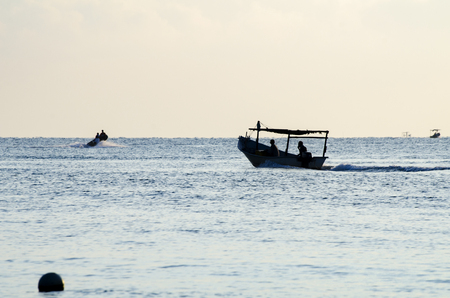1. Essential Travel Documents and Permits
Before you head out on your international fishing adventure, its important to make sure you have all the necessary travel documents and permits in order. Missing paperwork can turn your dream trip into a hassle real quick, so double-check everything before you leave.
Must-Have Travel Documents
Start with the basics—these are the documents every traveler should have ready:
| Document | Why You Need It |
|---|---|
| Passport | Your primary ID for international travel. Make sure its valid for at least six months beyond your return date. |
| Visa | Some countries require a visa for entry. Check with the embassy or consulate of your destination country well in advance. |
| Travel Insurance | Covers medical emergencies, trip cancellations, and lost gear—especially important if youre heading to remote areas. |
Fishing Permits and Licenses
Each country has its own rules when it comes to fishing. To avoid fines—or worse—do your homework ahead of time:
International Fishing Permits
If youre booking a guided trip, the outfitter may handle permits for you. But if youre going solo, youll need to apply yourself. These permits often depend on the species youre targeting and whether youre fishing freshwater or saltwater.
Local Fishing Licenses
Even if you have an international permit, many countries still require a local fishing license. For example, if youre heading to Canada or Australia, you’ll need a provincial or state-specific license.
Pro Tip:
Make digital copies of all your documents and store them on your phone or cloud storage just in case anything gets lost or stolen during the trip.
Checklist: What to Pack in Your Document Folder
| Item | Check |
|---|---|
| Valid Passport (with extra pages) | ✓ |
| Applicable Visas | ✓ |
| Printed Airline Tickets or E-Tickets | ✓ |
| Hotel and Outfitter Confirmations | ✓ |
| Fishing Licenses & Permits | ✓ |
| Emergency Contact Info | ✓ |
| Travel Insurance Details | ✓ |
Having all these documents ready will give you peace of mind and let you focus on what really matters—landing that trophy fish!
2. Fishing Gear Tailored to Your Destination
When planning your international fishing trip, packing the right gear is crucial. The rods, reels, tackle, and line you bring should match the species youre targeting and the type of water youll be fishing in—whether its saltwater flats, deep-sea offshore, mountain streams, or jungle rivers.
Choose Gear for Your Target Species
Different fish require different setups. A lightweight spinning rod might be perfect for trout in a European river, but youd need a heavy-duty setup for chasing tuna off the coast of Mexico. Research your destination and find out what species are common and what kind of gear locals use.
Sample Gear Recommendations by Region
| Region | Target Species | Recommended Gear |
|---|---|---|
| Southeast Asia (Freshwater) | Pacu, Giant Snakehead | Medium-heavy spinning rod, 30 lb braid, topwater lures |
| Alaska (Rivers) | Salmon, Rainbow Trout | Fly rod 8wt, floating line, streamers & egg patterns |
| Costa Rica (Offshore) | Sailfish, Mahi-Mahi | Heavy trolling setup, 50-80 lb test mono, skirted lures |
| Northern Europe (Lakes) | Pike, Perch | Baitcasting rod, wire leaders, crankbaits & jerkbaits |
Bring Travel-Friendly Equipment
If you’re flying internationally, youll want to avoid oversized luggage fees and potential damage during transport. Look for travel rods that break down into 4-6 pieces or telescopic rods that fit into carry-on-sized cases. Pair those with compact spinning or baitcasting reels that can handle a variety of conditions.
Packing Tips for Fishing Gear
- Use a hard case: Protect your rods in transit with a dedicated travel tube or hard case.
- Tackle smart: Pack a small selection of versatile lures that cover topwater, mid-depth, and bottom action.
- Check airline rules: Some airlines have restrictions on fishing rods and sharp objects like hooks—always check ahead!
A little planning goes a long way when it comes to packing the right fishing gear for an international adventure. With the proper equipment tailored to your destination, you’ll be ready to make the most of every cast abroad.

3. Clothing and Protective Apparel
When youre heading out on an international fishing trip, packing the right clothing is just as important as bringing your gear. Weather can change quickly, especially when youre on the water, so its smart to dress in layers and be ready for anything Mother Nature throws your way.
Layer Up for Changing Conditions
Dressing in layers allows you to stay comfortable throughout the day. Mornings might be chilly, midday could get hot, and sudden rain showers are always a possibility. Heres a simple guide for layering:
| Layer | Purpose | Recommended Items |
|---|---|---|
| Base Layer | Wicks moisture away from skin | Moisture-wicking long-sleeve shirts or thermals |
| Mid Layer | Provides insulation | Light fleece or insulated vest |
| Outer Layer | Protects from wind and rain | Waterproof jacket or shell |
Sun Protection Is a Must
Fishing often means long hours under direct sunlight, especially in tropical or high-altitude regions. Be sure to pack:
- Sun hat: Wide-brimmed for full face and neck coverage
- Polarized sunglasses: Reduce glare off the water and help spot fish below the surface
- UV-blocking buffs or neck gaiters: Protect your neck, face, and ears from sunburn
- UPF-rated clothing: Shirts and pants with built-in sun protection make a big difference
Be Prepared for Wet Conditions
You never know when youll get splashed—or soaked—while fishing abroad. Pack waterproof apparel to stay dry and comfortable:
- Rain jacket with hood: Lightweight but durable enough to block wind and rain
- Quick-dry pants or shorts: Avoid heavy fabrics that stay wet for hours
- Water-resistant footwear: Consider shoes or boots that can handle wet decks or muddy banks
Packing Tip:
Use compression bags to organize your clothing by layer or activity. This keeps your pack tidy and makes it easy to grab what you need each day.
No matter where youre headed—from the Amazon River to an Alaskan salmon run—being well-prepared with the right clothing will keep you focused on the fish, not the forecast.
4. Specialty Items and Personal Essentials
When heading out on an international fishing trip, packing the right specialty items and personal essentials can make a big difference in your comfort and safety. These are the things that might not be fishing gear, but they’re just as important—especially when youre far from home.
Travel-Specific Essentials
Different countries use different power outlets, so don’t forget to bring a universal power adapter to keep your electronics charged. If you take prescription medications, pack enough for your entire trip, plus a few extra days in case of delays. Keep them in their original containers for easier travel through customs.
Personal Hygiene & Health
Your daily hygiene routine doesn’t need to stop just because you’re off the grid. Toothbrush, toothpaste, deodorant, and any other must-have toiletries should go in your bag. Travel-size versions save space and meet airline regulations.
Recommended Personal Care Items:
| Item | Why You Need It |
|---|---|
| Sunscreen (SPF 30+) | Protects your skin from intense sun exposure on open water |
| Insect Repellent | Helps avoid bites from mosquitoes and other pests common near water |
| Basic First-Aid Kit | Covers minor cuts, blisters, or headaches while youre off the beaten path |
Snacks and Hydration
Don’t rely solely on what’s available at your destination. Pack high-energy snacks like protein bars, trail mix, or beef jerky to keep you going during long hours on the water. A hydration system such as a refillable water bottle or hydration pack is key—especially if you’ll be fishing in hot climates.
Destination-Specific Needs
Think about where youre going. Is it tropical? Cold? Remote? Tailor your essentials based on the environment. For example, if you’re headed to the Amazon or Southeast Asia, a mosquito net might be a smart addition. If you’re going somewhere cold, lip balm and hand warmers could come in handy.
5. Travel-Friendly Storage and Organizational Tools
When youre heading out on an international fishing trip, keeping your gear organized and protected is just as important as bringing the right gear in the first place. Long travel days, unpredictable weather, and limited packing space mean you need to be smart about how you store everything.
Waterproof Tackle Boxes and Dry Bags
Durable, waterproof tackle boxes help keep your lures, hooks, and other small tools safe from moisture and damage. Look for boxes with adjustable compartments so you can customize the layout based on what youre bringing. Dry bags are perfect for storing anything that needs to stay dry—like clothes, electronics, or documents. Theyre lightweight, come in various sizes, and can double as extra storage when youre out on the water.
Rod Travel Cases
Your fishing rods are some of the most delicate (and expensive) pieces of equipment you’ll bring. To avoid broken tips or bent guides, invest in a hard or padded rod travel case. Many are designed specifically for air travel, with TSA-approved locks and reinforced corners. If youre bringing multiple rods, look for a case that can safely fit all of them without crowding.
Packing Cubes for Clothing & Supplies
Packing cubes aren’t just for frequent flyers—they’re incredibly useful for anglers too. Use them to separate clothing by type (e.g., base layers, outerwear) or by activity (fishing gear vs. casual wear). This makes it easy to find what you need quickly while living out of a suitcase or duffel bag during your trip.
Recommended Organizational Tools
| Item | Purpose | Why Its Useful |
|---|---|---|
| Waterproof Tackle Box | Store lures, hooks, weights | Keeps items dry and organized |
| Dry Bag | Protect clothing/electronics | Prevents water damage during boat trips or rain |
| Rod Travel Case | Protect fishing rods in transit | Avoids breakage during flights or transport |
| Packing Cubes | Organize clothing & supplies | Saves space and keeps luggage tidy |
With the right storage tools, your international fishing adventure will be smoother and more enjoyable—no digging through messy bags or dealing with damaged gear.
6. Local Intel and Emergency Prep
Before you head out on your international fishing adventure, it’s smart to get familiar with the local scene and prepare for any unexpected situations. Doing a little homework ahead of time can save you a lot of stress later.
Know the Fishing Customs
Different countries have different rules and traditions when it comes to fishing. Some places might require special permits, while others may have specific regulations about what species you can catch or keep. Understanding these customs shows respect and helps avoid legal trouble.
Things to Research:
| Topic | Why It Matters |
|---|---|
| Fishing Licenses | You might need to apply online or buy one locally before you fish. |
| Catch Limits & Rules | Avoid fines by knowing what species are protected or off-limits. |
| Local Traditions | Some regions have cultural practices around fishing—knowing them helps you blend in and show respect. |
Emergency Contacts & Safety Info
If something goes wrong, being prepared makes all the difference. Save important info both digitally (on your phone or cloud storage) and as hard copies in case your devices fail or get lost.
What to Save:
- Your full travel itinerary
- Addresses and contact info for U.S. embassies or consulates in the country youre visiting
- Emergency numbers for local police, coast guard, or medical services
- Your travel insurance details
Language Tips
If there’s a language barrier, learning a few key phrases can be incredibly helpful—especially when asking for help or explaining an emergency.
Useful Phrases to Learn:
- “Help!” / “I need help.”
- “Where is the hospital?”
- “I’m allergic to…” (fill in any important medical info)
- “I’m looking for a fishing guide.”
- “Do I need a fishing license?”
A little preparation goes a long way—knowing the local fishing rules and having emergency plans ready will help make your international fishing trip smooth, fun, and safe.

